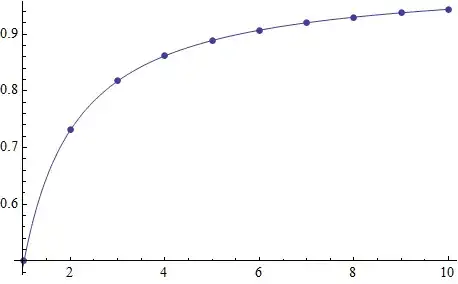I'm looking for the solution $x$ of
$$x^n+nx-n=0.$$
Thoughts: From graphing it for several $n$ it seems there is always a solution in the interval $[\tfrac{1}{2},1)$. For $n=1$, the solution is the fraction $\tfrac{1}{2}$ and for higher $n$, the solution shifts to the right.
I then saw that the equation reads $$F_n(x)=x$$ with
$$F:[0,1]\to[0,1],\ \ \ \ \ \ F_n(x):=1-\frac{x^n}{n}.$$
I think I got all conditions together for making the iteration of $F_n$'s the general soluton for the equation. I computed $$x_5=F_5(F_5(F_5(F_5(F_5(F_5(F_5(F_5(x_S)))))))),$$
with starting value $x_S=\tfrac{1}{2}$ and it seems to be the solution of the equation for $n=5$.
Related wikipedia links: Fixed point theorem, Banach fixed-point theorem, Fixed point iteration;
I wonder:
Have I found the soluton and can one evaluate the iteration to a closed form?
Might be that it involves polylogs. edit: At least Wolfram Alpha claims to know $$n(x)=W\left(\frac{-\log(x)}{x-1}\right)/\log(x),$$ even if $n(x)$ isn't too interesting.
In my case, how is the relation between the function $x(n)$ and (I think) the fixed point combinator for the iteration?
Does it matter what I choose for $x_S$ here? Can one relate it's value and the number for necessary iteration for a good agreement with the real value?
(Also, are there any results on which polynomial equations this technique works? The property $F:[0,1]\to[0,1]$ seemed accidental to me.)
